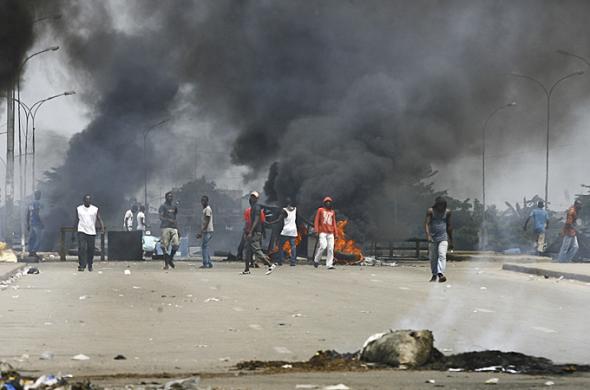|

Must a revolt be filmed and photographed to succeed? [EPA]
Demonstrations are continuing across the Middle East, interrupted only by the call for prayer when protesters fall to their knees on cheap carpets and straw mats and the riot police take a tea break. Egypt, in particular, with its scenes of unrelenting protesters staying put in Tahrir Square, playing guitars, singing, treating the injured and generally making Gandhi’s famous salt march of the 1940s look like an act of terror, captured the imagination of an international media and audience more familiar with the stereotype of Muslim youth blowing themselves and others up.
A non-violent revolution was turning the nation full circle, much to the admiration of the rest of the world.
“I think Egypt’s cultural significance and massive population were very important factors in ensuring media coverage,” says Ethan Zuckerman, the co-founder of Global Voices, an international community of online activists.
“International audiences know at least a few facts about Egypt, which makes it easier for them to connect to news there,” he says, drawing a comparison with Bahrain, a country Zuckerman says few Americans would be able to locate on a map.
Zuckerman also believes that media organisations were in part motivated by a “sense of guilt” over their failure to effectively cover the Tunisian revolution and were, therefore, playing “catch up” in Egypt.
“Popular revolutions make for great TV,” he adds. “The imagery from Tahrir square in particular was very powerful and led to a story that was easy for global media to cover closely.”
The African Egypt versus the Arab Egypt
Egypt was suddenly a sexy topic. But, despite the fact that the rich banks of the Nile are sourced from central Africa, the world looked upon the uprising in Egypt solely as a Middle Eastern issue and commentators scrambled to predict what it would mean for the rest of the Arab world and, of course, Israel. Few seemed to care that Egypt was also part of Africa, a continent with a billion people, most living under despotic regimes and suffering economic strife and political suppression just like their Egyptian neighbours.
“Egypt is in Africa. We should not fool about with the attempts of the North to segregate the countries of North Africa from the rest of the continent,” says Firoze Manji, the editor of Pambazuka Online, an advocacy website for social justice in Africa. “Their histories have been intertwined for millennia. Some Egyptians may not feel they are Africans, but that is neither here nor there. They are part of the heritage of the continent.”
And, just like much of the rest of the world, Africans watched events unfold in Cairo with great interest. “There is little doubt that people [in Africa] are watching with enthusiasm what is going on in the Middle East, and drawing inspiration from that for their own struggles,” says Manji.
He argues that globalisation and the accompanying economic liberalisation has created circumstances in which the people of the global South share very similar experiences: “Increasing pauperisation, growing unemployment, declining power to hold their governments to account, declining income from agricultural production, increasing accumulation by dispossession - something that is growing on a vast scale - and increasing willingness of governments to comply with the political and economic wishes of the North.
“In that sense, people in Africa recognise the experiences of citizens in the Middle East. There is enormous potential for solidarity to grow out from that. In any case, where does Africa end and the Middle East begin?”
|


